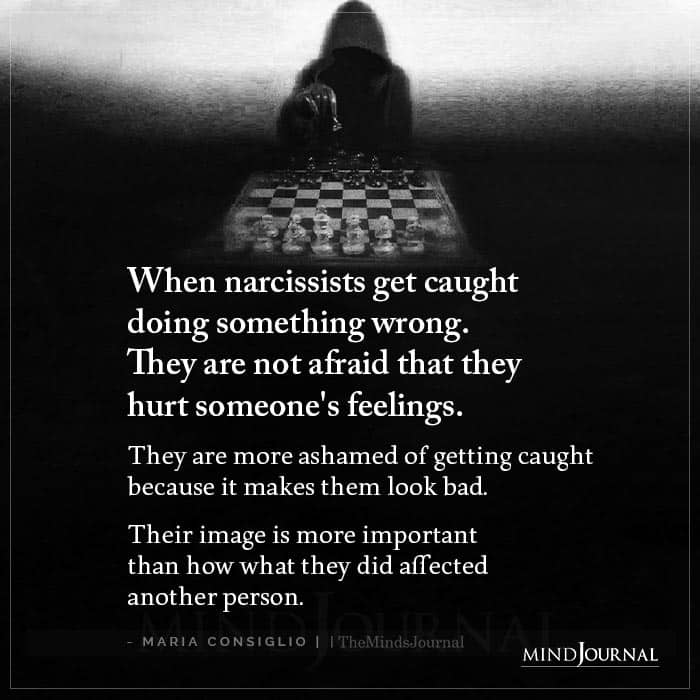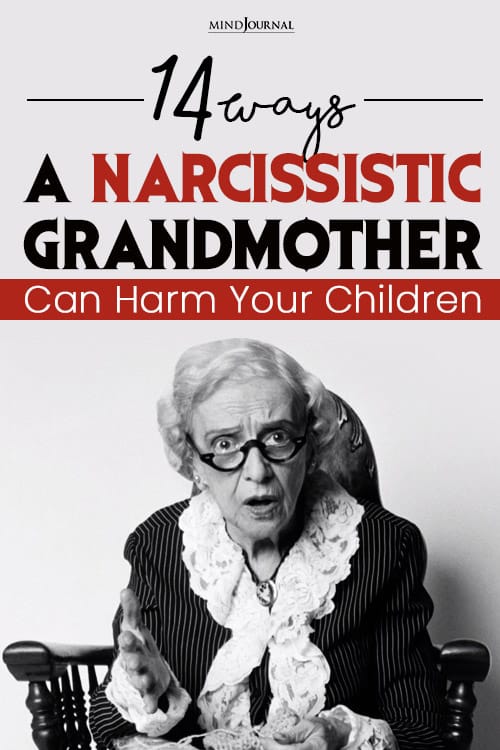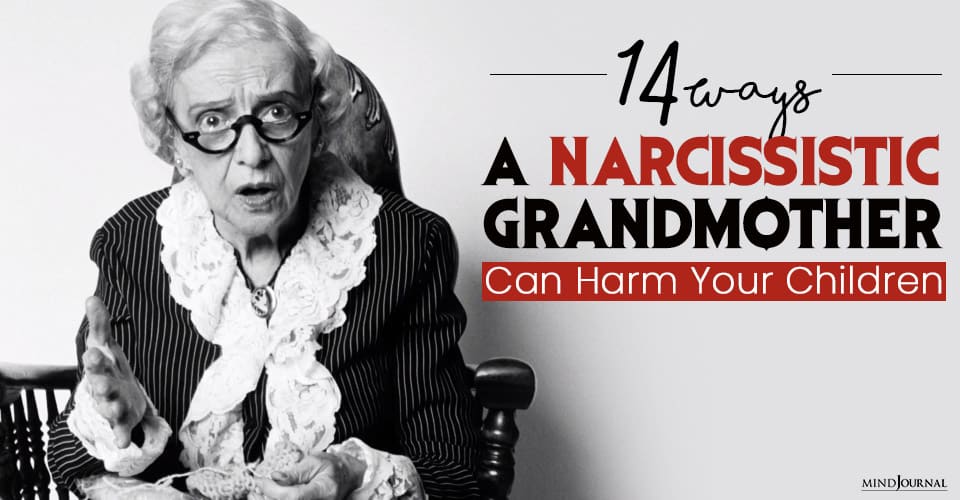Grandmothers are always there to protect you, cherish you, and make sure that they feed you so much, that you feel like you can’t walk anymore. When parents are too strict, your grandmother comes to the rescue, and makes you feel better, doesn’t she? But what do you do when you have a grandmother who is the exact opposite, that is, a narcissistic grandmother?
A narcissistic grandmother can be a hellish person to deal with, especially if you live in the same house. She can be toxic, insensitive, selfish, and most importantly, extremely hurtful. Just like having narcissistic parents can be a traumatic thing, having a narcissistic grandmother can end up destroying your mental peace, and your self-worth.
And it doesn’t just stop there, it can also negatively affect your children and their mental well-being.
Having a narcissistic grandmother in the family is like having a poisonous spider, who is constantly attacking and poisoning everyone around it. Slowly and steadily, she sucks the life and happiness out of everyone and leaves behind only pain, trauma, and sadness.
Are you having a tough time dealing with a narcissistic mother? In one of the previous articles, we discussed 63 things narcissistic mothers say to manipulate and control you. Refer to it in case you need clarity that it is not always your fault and come up with strategies to deal with her.
Here Are 14 Ways A Narcissistic Grandmother Can Hurt Your Children
1. Wanting to be the “favorite”.
You know you are dealing with a narcissistic grandmother when she forces everyone to make her their favorite, even though she doesn’t deserve it even a little bit. She wants a picture-perfect relationship with her grandkids and expects the parents to believe, enforce and maintain this fantasy.
Being a grandmother, she has a grandiose kind of attitude towards her grandchildren, and also indulges in favoritism, so that everyone competes for her love and attention. This will allow her to be everyone’s “favorite”.
2. Saying negative things behind your back.
Narcissistic grandmothers stay under the illusion that they have the right to criticize, question, and insult your parenting skills whenever and however they want. She also says negative things about your kids directly when you are not there to defend them. In order to make herself better, she scrutinizes them to find faults.
This can become a reason why you may not be comfortable leaving your kids alone with her. A study suggested that saying negative things can significantly impact a child’s mental stability.
3. Being verbally abusive to your children.
Narcissistic grandmothers do not understand love. They don’t learn from their past mistakes. Narcissistic people love stomping others to boost their self-esteem and they tend to display the same behavior to their grandchildren. Verbally abusing them in order to mold them according to their will seems like a plausible option to them. Yelling, name-calling, teasing, or using sarcasm are some of the abusive methods they resort to. They attack their self-esteem and confidence to get what they want.
Constantly abusing children verbally can have a significant effect on the child’s self-confidence and self-esteem. It may also hinder their emotional development. The grandmother may not even realize that she is verbally chipping away the child’s self-esteem. A study pointed out that child abuse can cause disordered psychological and developmental problems.
4. Being physically abusive to your children.
Physical abuse seems like a good tool to use to mold your children. A narcissistic grandmother can use physical abuse such as beating, thrashing, spanking, or pinching as a means to discipline her grandchild. They don’t care what is best for your child. They simply want to be recognized as an authoritative figure who can do as she pleases.
A 2012 study pointed out that physical discipline is ineffective and can have a significant impact on the emotional and psychological well-being of the child. It was also found that physical punishment elicits aggression. Hence it is essential to pay close attention whenever your children are at their grandparent’s house to ensure that they aren’t being physically abused.
5. Unwilling to be a part of your child’s life.
Another type of narcissistic grandmother is a neglectful grandmother. She is always unavailable for babysitting and always reserves it for her favorite ones. The neglectful grandmother doesn’t have time to see your child’s pictures or participate in celebrating their achievements.
The consequences of these actions depend on how often your kids visit their grandmother. In case they see her once or twice a year there can be no major consequence.
Related: 6 Silent Soul Destroyers Narcissists Use To Destroy You
6. Your kids don’t tend to bond with her.
A narcissistic grandmother becomes so busy fulfilling her egoistic needs that they overlook the subtle cues of discomfort that the child displays. Some of the signs that your child has zero emotional connection with their grandmother are:
- They don’t look forward to seeing her.
- Avoid spending time with her, especially alone.
- Tend to be sad or upset after seeing her.
- Gets quiet when she enters the room.
- Feels hesitant to approach her.
7. Using guilt trips and manipulation to get what she wants.
When things don’t go her way she tends to rant, pout, complain about things not going her way, create diversions, play the victim, or find other ways to control and manipulate the situation. She is extremely good at playing emotional games and she plays it dirty.
She will attempt to mold them into her perfect little minions who will do whatever she wants. If this continues, your children will grow up to be people pleasers and base their self-esteem on how well they can please other people. Research suggests that children subjected to narcissistic parents or grandparents grow up to be anxious adults.

8. She has no respect for your parental policies.
As a grandmother, she believes that she is in authority. Your parenting rules do not apply to her. She disagrees with you because she wants to be the boss. For instance, if you say no sugar before dinner, she will take your kids to a candy store. If bedtime is at 9 pm, she will keep them up after midnight.
She doesn’t respect your authority because she feels threatened by anyone else’s authority. Due to this she will refuse to follow your parenting rules, style, decisions and interfere with your child’s upbringing.
9. She always has to be right.
In case you criticize or share your concerns related to your child, she will react defensively, play victim, take offense or conveniently forget what you were talking about. In her mind, she is always right and she did nothing wrong with the kids.
Related: How Narcissists Control You: 11 Techniques They Use
10. Using grandchildren to feed her “narcissistic supply”.
Narcissistic supply refers to the constant need for admiration and attention. Children can be easily deceived and manipulated since they are innocent. Children cannot understand deceit and manipulation. She needs to feel superior all the time and who better to feed her ego than children. She constantly needs to feel important and so she will go to great lengths to fulfill this desire, even if they are children.
Even if their grandparents are manipulative, abusive, or controlling, children may still adore them. Hence children are a perfect source of narcissistic supply.
The grandmother will love her grandchildren as long as they adore her. But she will withdraw her attention if they stop being her minions. For a narcissistic grandmother, love and attention are often used for serving herself. She will spend time with her grandchildren when it fulfills her narcissistic needs.
11. Mistreating people in front of your children.
People who are narcissists do not treat people well. They either belittle them or believe that they deserve no appreciation. A narcissistic person always believes that they are better than other people. So they think it’s okay to mistreat others.
For instance, yelling at the delivery boy for not delivering her things on time. This may not be a big deal but children tend to pick up on such behaviors. Hence if your children see their grandmother mistreating other people, they may grow up to believe that it’s okay to mistreat people.
12. Lashing out at your children.
A narcissistic grandmother may become more unforgiving and lash out as the child starts to grow up and discover their individuality. Since they are no longer their grandma’s little obedient creatures, she starts to become more distant and punishing. If things don’t go her way she will lash out in order to make her point valid.
How she lashes out on your children will depend on how far the child has deviated from her idea of what and how they should be. Expect angry outbursts or passive-aggressive behavior whenever something doesn’t go according to her will.
A 2019 study suggests that kids who are often subjected to interpersonal conflicts that result in angry outbursts, often grow up to be more aggressive and depressed.
13. Plays the victim to gain sympathy and support.
She sees herself as the boss and everyone has to do as they are told. In this case, her grandchildren are no exception. As long as everyone behaves the way she wants them to, she is happy.
However, if something doesn’t go quite her way she will complain and play the victim to gain sympathy and support. Such behaviors can interfere with the child’s mental health. If children are not allowed to express themselves, they may develop low self-esteem and confidence later in life.

14. She loves causing drama.
One of the most common tactics of narcissists to satisfy their egos is to cause drama. As a grandmother, she loves creating chaos and drama whenever the kids don’t behave the way she wants them to or if things don’t go her way. She acts as if it’s for their benefit and that is why they must do all her chores.
She thinks of her grandkids not as people but as tools for her happiness and to fuel her ego. Such behaviors can negatively impact your child’s mental health because they will grow up to believe that they are only meant to serve other people and please them.
This will also extinguish their identity and teach them to bury their feelings. They will grow up to believe that their self-esteem is based on how well they can please other people.
Related: 5 Devaluation Triggers Of A Narcissist
Things to do if your child has a narcissistic grandmother
In case you were raised by a narcissistic mother you probably weren’t celebrated as a child should be. It took you a long time to realize that she was abusive and everything was always about her.
Your motherly instincts will tell you that you should protect your child from such negativity and abuse before it interferes with your child’s upbringing. It is important to use your own judgments and whether or not you have experienced these as a child.
Some of the things you can do in case your child has a narcissistic grandmother are:
- Setting parental rules and boundaries.
- Recognize the patterns of her behavior.
- Regulated visits.
- Educate your kids about narcissistic behavior.
- Don’t force your kids to be close with her if they are uncomfortable.
- Resorting to family therapy if she wants to try it.
- Hiring a family law attorney.
- Sever all ties as a last resort.
As a mother, it is of utmost importance to protect your children from such chaos and negativity that a narcissistic grandmother might portray. Narcissistic people need chaos to thrive and satisfy their egos.
In such circumstances, it becomes crucial to ensure that your child has a healthy and positive upbringing. As a parent, it becomes your responsibility to ensure that your children have relationships with positive and engaging adults who encourage them to be better in every aspect of their lives.











Leave a Reply